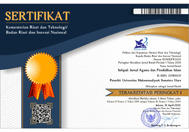Education of the Salafi Dakwah in Changing the Worldview of the People in the Village of Sapugarabree, Sumbawa West District
Abstract
The study aims to analyze the impact of the Salafi movement's education on the mentality and life views of the people in Sapugarabree Village, Sumbawa West District, NTB. The Salafi movement, as a current in Islam with different beliefs and practices from the majority of the Muslim community in Indonesia, has generated a rejection of the culture, religion, and social life in the village that is considered to deviate from the original teachings of Islam (bid’ah). The research method used is qualitative-descriptive with a field study approach. Data is collected through interviews and literary analysis to understand the change in mentality that occurs. The results of the research show that the Salafi movement has influenced Sapugarabree people's thinking through various approaches, such as study, open discussion, musollah building, and foundations. Despite this, the Sapugarabree people have different reactions to Salafi teachings. Some people accept them, while others reject them because they are considered too dogmatic and narrow. The Salafi movement has been able to significantly change the worldview of people about culture, religion, and social life. This research provides further understanding of the dynamics of change in society associated with the influence of the Salafi movement, with implications that the approach to worship and education needs to be adapted to be more acceptable to the diverse layers of society.
Keywords
Full Text:
PDFReferences
Amalia Yunia Rahmawati. (2020). The Da'wah Strategy of the Salafi Jamaah Community in Pringgabaya Village, Pringgabaya District, East Lombok. Mataram State Islamic University. https://doi.org/http://etheses.uinmatara m.ac.id/id/eprint/4212
Ansori, M. (2014). Science of Islamic Education. Digilib UIN Sunan Ampel Surabaya, 1 (SOCIAL AKHLAQ), 167.
Daven, M. (2019). Politics in the Name of God. Ledalero Journal, 18(1), 23-60. https://doi.org/10.31385/jl.v18i1.162.22 -60
Fadila, N. (2023). The Negative Impact of Wahabi on Society. Journal of Islamic Interdisciplinary Studies, 2(1), 45-56.
Fahamsyah, F. (2020). Historical Dynamics and Salafi Thought. Al- Fawa' Id Journal, X(2), 26-41.
Hafid, W. (2020). Questioning the Salafi Movement in Indonesia (Pros and Cons of Salafi Da'wah Methods). AlTafaqquh: Journal of Islamic Law, 2(1),29-48. https://doi.org/10.33096/altafaqquh.v2i 1.87
Hasan, N. (2013). Dynamics of the Religious Life of Nahdiyin-Salafi in Pamekasan Madura. ISLAMICA Journal of Islamic Studies, 8(September), 85-102. https://doi.org/https://doi.org/10.15642/ islamica.2013.8.1.84-102
Hidayatulah, R. P. (2022). The Development of the Salafi Da'wah Movement in the Context of Democracy: Case Study in Tanjung Pinang City. Journal of Indonesian Sociology of Religion (JSAI), 3(2), 96-110. https://doi.org/10.22373/jsai.v3i2.1754
Hudzaifah, A. F. (2023). The Domination of Salafi Movement in Pogung Dalangan Yogyakarta Ahmad. UANSA Journal of Islamic and Social Studies, XVI(1), 1- 12. https://doi.org/http://dx.doi.org/10.2930 0/njsik.v16i1.11237
Jamal, F. (2020). Pros and Cons of Understanding the Salafi Group's AntiBid'Ah Movement. Indo-Islamic Journal, 8(1), 23-37. https://doi.org/10.15408/idi.v8i1.17538
Melianna, S. and S. (2022). The Wahabi School. Papers of Nida El-Adabi Islamic College, 5(3), 1-13.
Muliono, S., Suwarko, A., & Ismail, Z. I. (2019). The Salafi Movement and the Deradicalization of Islam in Indonesia. Religió: Journal of Religious Studies, 9(2), 244-266. https://doi.org/10.15642/religio.v9i2.12 07
Musyafak, N., & Nisa, L. C. (2021). Islamic Da'wah and prevention of radicalism through community resilience. Journal of Da'wah Science, 41(1), 56-72. https://doi.org/10.21580/jid.v41.1.7869
Muthohirin, N., Kamaludin, M., & Mukhlis, F. (2022). Transformation of Salafi Islamic Education: Implications for Multiculturalism in Indonesia. The Annual Conference on Islamic Religious Education, 2(1), 1-24. Retrieved from http://acied.pppaiindonesia.org/index.php/acied/article/view/14%0Ahttp://acied.pppaiindonesia.org/index.php/acied/article /viewFile/14/22
Nasution, S. T. W. (2013). The Concept of Islamic Ideology (Salafi Case Study in Jalan Karya Jaya Gang Eka Wali Pribadi Medan Johor Sub-district, Medan). North Sumatra State Islamic Institute Medan.
Putra, A. E. (2016). Tolerant Islam: Building Tolerance with Spiritual Path. Kalam, 10(2), 38-1402. https://doi.org/10.24042/klm.v10i2.6
Rabbani, I. (2017). Salafism: History and Conception. Tasfiyah, 1(2), 245-276. https://doi.org/10.21111/tasfiyah.v1i2.1 853
Redjosari, S. M. (2021). Salafi, Educational Institutions, and Da'wah Resistance. AlFawa'id Journal: Journal of Religion and Language, 11(1), 12-27. https://doi.org/10.54214/alfawaid.vol11 .iss1.153
Rohmadi, R., & Akmal, M. F. (2022). Correlation between Religion and Society in Responding to Local Culture in Sungai Duren Village. Journal of Research Innovation and Community Service, 2(2), 113-119. https://doi.org/10.53621/jippmas.v2i2.1 54
Rosadi, A. (2015). The salaf movement, 7(2), 194-205.
Rumahuru, Y. Z. (2012). Dialogue of Custom and Religion, Beyond Domination and Accommodation (Muslim Hatuhaha in Haruku Island, Central Maluku). Al-Ulum, 12(2), 303- 316.
Saputro, O. W. W. (2022). The Purpose of Islamic Education According to Salafi Scholars. Al-Fawa'id Journal: Journal of Religion and Language, 12(2), 205- 224. https://doi.org/10.54214/alfawaid.vol12 .iss2.320
Sukarta, S. (2021). The Da'wah Method of Ustadz Salafiyah in Internalizing Islamic Values through Routine Recitation. Ibtida'iy: Journal of PGMI Study Program, 6 (2), 42-52. https://doi.org/10.31764/ibtidaiy.v6i2.6 301
Susanti, E. R. I. (2018). Schools of thought in kalam. Journal of Ad-Dirasah, 1(1), 23-42.
Zikriadi, Amri, M., & Santalia, I. (2022). Salafi Religious Understanding and Unrest in the Community and its Solution. MUSHAF JOURNAL: Journal of Quranic and Hadith Sciences,2(3),288-298. https://doi.org/10.54443/mushaf.v2i3.7 5
DOI: https://doi.org/10.30596/16971
Refbacks
- There are currently no refbacks.
Intiqad Jurnal Agama dan Pendidikan Islam is abstracting & indexing in the following databases:
View My StatsEditorial Address:
Faculty of Islamic Religion, Universitas Muhammadiyah Sumatera Utara. Jl. Mukhtar Basri No. 3 Medan 20238 Telp. (061) 6622400 ext. 27 dan 28 Fax. (061) 6625474. e-mail: intiqad@umsu.ac.id

_(1).png)























